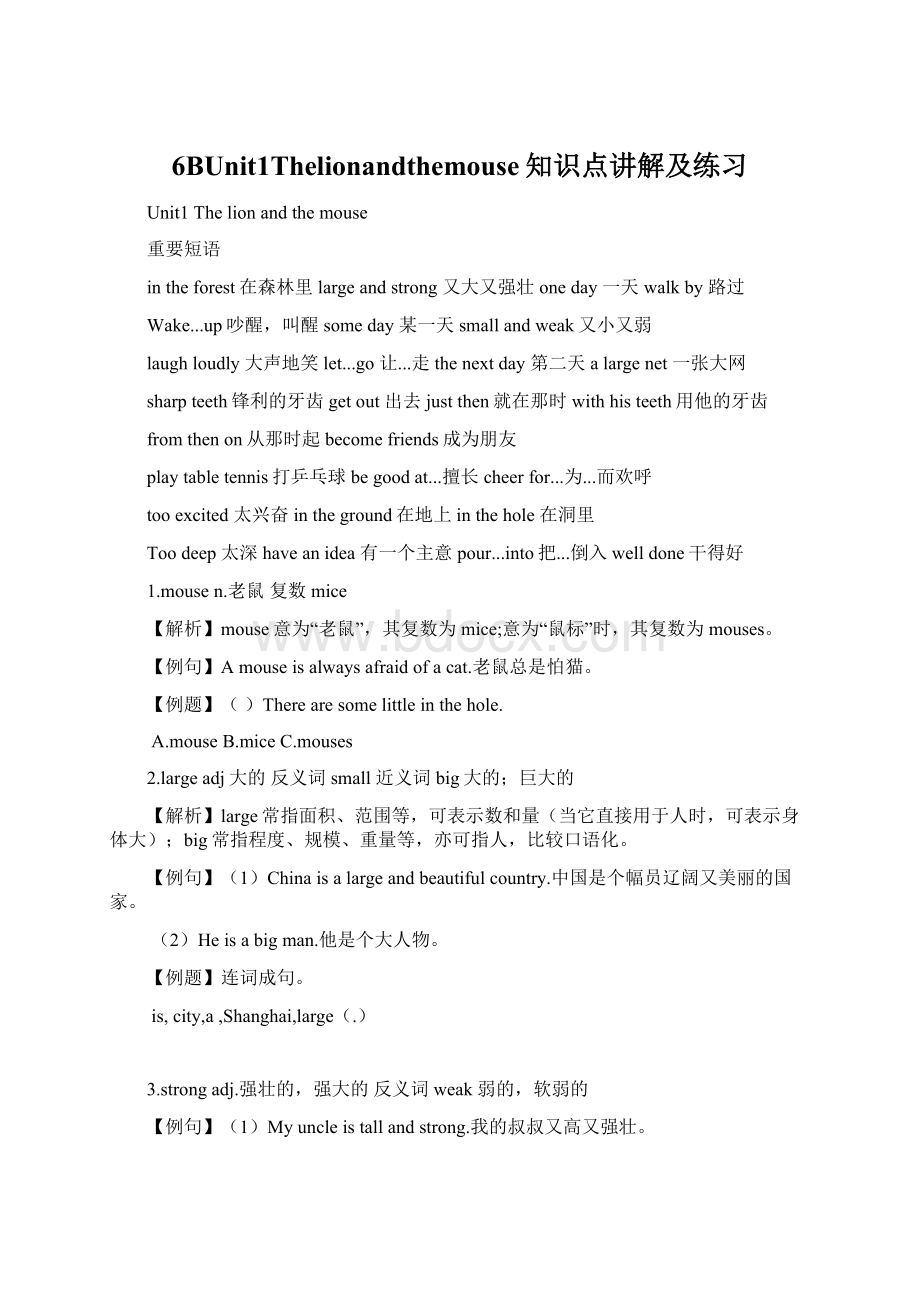6BUnit1Thelionandthemouse知识点讲解及练习.docx
《6BUnit1Thelionandthemouse知识点讲解及练习.docx》由会员分享,可在线阅读,更多相关《6BUnit1Thelionandthemouse知识点讲解及练习.docx(10页珍藏版)》请在冰豆网上搜索。

6BUnit1Thelionandthemouse知识点讲解及练习
Unit1Thelionandthemouse
重要短语
intheforest在森林里largeandstrong又大又强壮oneday一天walkby路过
Wake...up吵醒,叫醒someday某一天smallandweak又小又弱
laughloudly大声地笑let...go让...走thenextday第二天alargenet一张大网
sharpteeth锋利的牙齿getout出去justthen就在那时withhisteeth用他的牙齿
fromthenon从那时起becomefriends成为朋友
playtabletennis打乒乓球begoodat...擅长cheerfor...为...而欢呼
tooexcited太兴奋intheground在地上inthehole在洞里
Toodeep太深haveanidea有一个主意pour...into把...倒入welldone干得好
1.mousen.老鼠复数mice
【解析】mouse意为“老鼠”,其复数为mice;意为“鼠标”时,其复数为mouses。
【例句】Amouseisalwaysafraidofacat.老鼠总是怕猫。
【例题】()Therearesomelittleinthehole.
A.mouseB.miceC.mouses
2.largeadj大的反义词small近义词big大的;巨大的
【解析】large常指面积、范围等,可表示数和量(当它直接用于人时,可表示身体大);big常指程度、规模、重量等,亦可指人,比较口语化。
【例句】
(1)Chinaisalargeandbeautifulcountry.中国是个幅员辽阔又美丽的国家。
(2)Heisabigman.他是个大人物。
【例题】连词成句。
is,city,a,Shanghai,large(.)
3.strongadj.强壮的,强大的反义词weak弱的,软弱的
【例句】
(1)Myuncleistallandstrong.我的叔叔又高又强壮。
(2)Ourcountryisbecomingstrongerandstronger.我们的国家正在变得越来越强大。
【例题】()Theelephantisbigand.
A.shortB.weakC.strong
4.walkby(动词短语).走过路过
【例句】—Whatarethechildrendoing?
孩子们正在干什么?
—They’rewalkingbytheforest.他们正在走过森林。
【例题】完成句子。
YangLingwalkedbytheteacher’sofficejustnow.杨玲刚才路过老师的办公室。
5.wakeup(动词短语)吵醒,叫醒woke
【解析】wake...up中“up”为副词,如果后面接的宾语是代词,则要放在wake...up的中间;如果后面接的宾语是名词,则放在中间或后面均可。
【例句】
(1)Bequiet!
Don’twakeupyourfather.安静!
不要吵醒你爸爸。
(2)It’slate.Wakehimupquickly.不早了。
快把他叫醒。
【例题】改错。
(B)Youcanwakeupmeatseveno’clock.Wakemeup
ABC
6.someday(副词短语)某一天
【解析】指将来不确定的某一天。
【例句】IwanttogotoBeijingsomeday.我想将来某一天去北京。
【例题】连词成句。
want,meet,cousin,your,I,day,to,some(.)
7.quietlyadv.小声地,安静地quiet安静的
【例句】Thestudentsaresittingquietlyintheclassroom.学生们正安静地坐在教室里。
【例题】()Youshouldwalkinthehospital.
A.quietlyB.quicklyC.loudlyD.quiet
8.weakadj.弱的,软弱的反义词strong强大的,软弱的
【同音词】week星期;周
【例句】Shewasweaklastmonth.她上个月身体很虚弱。
【例题】()Atigeris------------,butanantis------.
A.strong;weakB.weak;strongC.strong;heavy
9.loudlyadv.大声地adj.loud大声的
【短语】speakloudly大声地说
【例句】Thechildrenareshoutingloudlyintheplayground.孩子们正在操场上大声地喊叫。
【例题】选出所给单词同类的选项。
()loudlyA.quietlyB.cloudyC.July
10.let...go(动词短语)释放,放开
【解析】let后面接动词原形。
【例句】
(1)Thepolicemmanhadtoletthemango.警察不得不让那个人走了。
(2)Thekinglethimgoatlast.最后,国王释放了他。
【例题】改错。
()Finally,thelionletthemousetogo.go
ABC
11.thenextday(副词短语)第二天
【解析】tomorrow是指从今天向后的第一天,意为“明天”;thenextday是指某个特定时间的后一天,即可指过去,也可指将来。
【例句】Thenextday,wevisittheGreatWall.第二天,我们参观了长城。
【例题】根据中文意思,完成句子。
我们打算八月九号去南京,第二天去上海。
WearegoingtoNanjingontheninthAugust,andwe’regoingtoShanghai.
n.网复数nets
【例句】Themancaughtarabbitwithanet.那个男人用网捉住了一只兔子。
【例题】选出单词划线部分读音与其余不同的选项。
()A.netB.cleverC.telephone
13.bitev.咬三单bites现在分词biting过去式bit
【例句】LiuTao,don’tplaywiththedog.Itmaybiteyou.刘涛,别和那只狗玩。
它可能会咬你。
【例题】根据中文提示,完成句子。
Themousebit(咬)aholeinthenetandranaway.run
14.sharpadj.锋利的,尖的
【例句】Theknifeislongandsharp.那把刀又长又锋利。
【例题】根据中文意思,完成句子。
狮子有锋利的牙齿。
Thelionhas.
15.sadlyadv.难过地,伤心地adj.sad反义词happily开心地
【例句】
(1)Hesaidsadly,”Ilostmywatch.”他难过地说:
“我弄丢了我的手表。
”
(2)Theycriedsadly.他们伤心地哭了。
crycried
【例题】用所给单词的适当形式填空。
Thegirllookssad.Nowsheiscryingsadly.(sad)
16.justthen(副词短语)就在那时
【解析】justthen是表示过去的时间状语,通常用于一般过去时态,其句子的谓语动词也要用过去时。
【例句】Justthen,Isawathiefgoingintotheroom.就在那时,我看到了一个小偷进入了房间。
【例题】(),therewasaheavyrain.
A.NowB.JustthenC.Tomorrow
17.soonadv.不久,很快
【例句】Waitaminute,myfatherwillbebacksoon.等一会儿,我爸爸很快就会回来。
Seeyousoon.再见。
【例题】选出与其余单词不同类的选项。
()A.strongB.largeC.soon
18.happilyadv.开心地,高兴地adj.happy高兴的
【解析】以y结尾的形容词变为副词时,将y变为i,再加ly,类似的还有angry---angrily。
【例句】Thechildrenaresinginganddancinghappilyintheroom.
孩子们正在房间里开心地唱歌跳舞。
【例题】用所给单词的适当形式填空。
Theyweretoseethegirl.Thentheyplayedtogether.(happy)
19.fromthenon(副词短语)从那时起
【对应短语】fromnowon从今往后
【解析】fromthenon是表示过去的时间状语,通常用于一般过去时,其句子的谓语动词要用过去式。
【例句】Fromthenon,theybecamegoodfriends.从那以后,他们成了好朋友。
【例题】(),hedidn’tplaythepianoanymore.
A.FromnowonB.FromthenonC.Now
20.cheerv.欢呼三单cheers现在分词cheering过去式cheered
【短语】cheerfor...为...而欢呼
【例句】Theyarecheeringfortheirwin.他们正在为他们的胜利而欢呼。
【例题】根据中文提示,完成句子。
Weweresoexcitedand(欢呼)loudlyinthelivingroom.
21.hitv.打,击三单hits现在分词hitting过去式hit
【解析】hit的过去式是不规则变化,与原形相同,类似的还有let,hurt,cut,put,read等。
【例句】Thestonehitthedogonthehead.那块石头击中了狗的头部。
【例题】()Theboythebirdwithastoneanditflewaway.
A.readB.putC.hit
22.deepadj.深的
【例句】Wecan’tswimintheriver.It’stoodeep.我们不能再这条河里游泳。
它太深了。
【例题】()Theriverisabouttenmetres.
A.highB.tallC.deep
23.reachv.够得着三单reaches现在分词reaching过去式reached
【解析】reach除了表示“够得着”,还可表示“到达”,相当于getto。
【例句】
(1)Thepearistoohigh.Ican’treachit.那个梨太高了。
我够不着它。
(2)WereachedWuhanon23March.我们在3月23日到达武汉的。
【例题】根据中文提示,完成句子。
Themonkeywantsto(够得着)thebananas
24.quicklyadv.迅速地,快地adj.quick迅速的反义词slowly慢地
【解析】quick是形容词,通常放在be动词之后或名词之前;quickly是副词,通常放在动词之后。
【例句】
(1)SuHairunsveryquickly.YangLingrunsquicklytoo.苏海跑得很快,杨玲也很快。
(2)Youmustfinishtheworkquickly.你们必须快速完成这项工作。
【例题】用所给单词的适当形式填空。
SuYangiscleverand.Shealwayslearns.(quick)
25.pour...into(动词短语)把...倒入
【例句】Youshouldn’tpourdirtywaterintotheriver.你不应该把脏水倒入河里。
【例题】根据中文意思,完成句子。
她正在把牛奶倒入杯子里。
Sheisthemilktheglass.
2.You’resosmallandweak!
你是如此弱小!
【解析】small与weak都是形容词,跟在be动词之后作表语,其前科插入so(如此),very(非常),too(太)等表示程度。
【例句】Thebagistooheavy.这只包太重了。
【例题】根据中文意思,完成句子。
那个故事我昨天看了三遍。
它是如此有趣。
Ireadthestorythreetimesyesterday.It.
3.Thenextday,twomencaughtthelionwithalargenet.
第二天,有两个人用一张大网捉住了狮子。
【解析】catch...with...意为“用...捉住...”,catch的过去式为不规则变化,即caught,with介词,在此意为“用”。
【例句】
(1)Childrenoftencatchinsectswithnetsinsummer.孩子们在夏天经常用网捕捉昆虫。
(2)Weseewithoureyesandhearwithourears.我们用眼睛看,用耳朵听。
【例题】连词成句。
with,its,an,nose,water,elephant,drinks(.)
4.HowcanIgetout?
我们怎样才能出去呢?
【解析】此句是由how引导的特殊疑问句句式,how是对方式、程度、状况等进行提问的疑问副词。
【例句】—Howdoyoufeel?
你感觉怎么样?
—Ifeeltired.我感觉累了。
【例题】对划线部分提问。
WearegoingtoShanghaibytrain.
youtoShanghai?
5.SamandBobbyareplayingtabletennishappily.萨姆和波比正在开心地打乒乓球。
【解析】此句为现在进行时的用法,现在进行时表示说话时动作正在发生,其构成形式为“am/is/are+doing”。
【例句】—WhatisSuYangdoing?
苏阳正在干什么?
—She’sdrawingpictures.她正在画画。
【例题】()Mymotherthedishesinthekitchennow.
A.washesB.washedC.iswashing
6.You’rereallygoodattabletennis,Sam.你真的很擅长打乒乓球,萨姆。
【解析】begoodat...意为“擅长......”,后接名词或动词的-ing形式。
其同义短语为“dowellin...”。
【例句】
(1)HelenisgoodatEnglish.海伦擅长英语。
(2)Theyaregoodatswimming.他们擅长游泳。
【例题】根据中文意思,完成句子。
(1)我的姐姐擅长语文。
MysisterChinese.
(2)我们擅长踢足球。
Wefootball.
7.Samhasanidea.萨姆有一个主意。
【解析】haveanidea意为“有一个主意”,也可以在idea前面加good,bad等形容词,此时前面的不定冠词要改为a。
【例句】—Howshouldwedoit?
我们应该怎样做呢?
—Ihaveagoodidea.我有一个好主意。
【例题】根据中文意思,完成句子。
就在那时,波比有了一个坏主意。
Justthen,Bobbyidea.
语法专题
1.副词在句中修饰谓语动词作状语,副词修饰动词时一般放在所修饰的动词之后。
【例句】
(1)Thestudentsplayedgameshappilyintheplayground.
学生们在操场上开心地玩游戏。
(2)Thechildrensangsongsexcitedlyattheparty.孩子们在聚会上兴奋地唱着歌。
【例题1】根据中文意思,完成句子。
(1)学生们正在课堂上认真听讲。
Thestudentsinclass.
(2)不要在图书馆大声地笑。
Don’tinthelibrary.
2.形容词变为副词的方式:
一般情况下,形容词变为副词时只要在其词尾加“ly”即可,以y结尾的则先变y为i,再加ly。
【例句】
(1)Pleasebequiet.Sitquietly,class.请安静。
安静地坐着,同学们。
(2)Sheisahappygirl.Sheplayshappilyeveryday.
她是个快乐的女孩。
她每天都玩得很开心。
【例题2】用所给单词的适当形式填空。
(1)Thewomanwasvery.Shewascrying.(sad)
(2)Thelionbecome.Heshould.(angry)
3.不规则变化的动词过去式需要我们单独记忆,不规则变化的动词过去式比较有特点。
如
(1)与原形相同:
let--lethit--hitcut--cutput--puthurt---hurtread---read
(2)改变元音:
meet--metget---gotsit---satcome---camedrink---drank
sing---sangswim---swamknow---knewdraw---drew
(3)其他:
bring---broughtbuy---boughtcatch---caughtteach---taught
say---saidtell---told
【例句】
(1)Thedogbittheropeandranaway.狗咬断了绳子逃跑了。
(2)ImetMrGreeninthestreetyesterday.我昨天在街上遇见了格林先生。
【例题3】()1.Theykitesintheparkyesterday.
A.flyB.flewC.flyed
()2.HemanyphotosduringhisholidayinLondon.
A.tookB.takedC.takes
练习与检测
一、英汉互译。
1.就在那时
2.擅长英语
3.狮子来了!
4.太兴奋
5.pourwastewaterintothebin
6.singsongscarefully
7.catchthelittlemousewithanet
8.大国家
9.又高又大的男人
10.某一天
11.叫醒我们
12.够得着树上的那些花
13.走过大厅
14.sharpteethintheloin’smouth
15.cheeringfortheirsuccess(成功)
16.letitgo
二、从Ⅱ栏中选出与Ⅰ栏相对应的答句,将序号填在括号内。
()1.HowcanIhelpme?
A.Don’tbesad.Icanhelpyou.
()2.I’msmallandweak.B.Icanbitethenetwithmyteeth.
()3.HowcanIgetout?
C.Yes,you’reright.
三、填空。
LastSunday,I________(go)toashoppingcentrewithmymumanddad.We________(see)asmallboyonthefloor.He________(look)sad.We________(go)tohimand________(help)himup.I________(ask)him,”AreyouOK?
”He________(say),”Ican’tfindmymum.”Dad________(take)himtoanofficeintheshoppingcentre.I________(give)himasweet.Thesmallboy________(become)happy.I________(be)happytoo.
四、阅读理解。
Thelionandthduck
Itisahotdayinsummer.Alioniswalkingalongalake.Heislookingforsomethingtoeat.Heisveryhungry.Agooseisswimminginthewater.Thelisoisveryhappytoseehim.“Theismylunch,”Thelionsaystohimself(自言自语).
“HelloMr.Goose!
”“Goaway,youbablion”saysthegoose.“Ihavegoodnewsforyou.”“Whatisit?
”askythegoose.“Idon’twantotheranimalstohearit.Pleasecomehere.”Saysthelion.Thepoorgoosegestoutofthewaterandrunstothelion.Thelioneatshimup.
()1.Thelionwantsto________.
A.walkalongthelakeB.findsomethingtodrinkC.findsomethingtoeat
()2.________saysto________,”Thereismylunch.”
A.Thelion;himselfB.Theduck;himselfC.Thelion;theduck
(